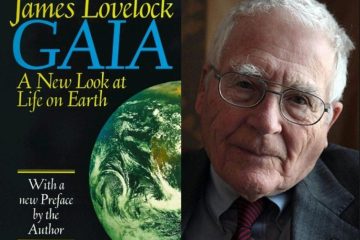In the intricate tapestry of ecosystems that blanket our planet, there are visionaries who delve deep into the essence of Gaia, seeking to unravel the secrets of her interconnected web. Among these luminaries stands James Lovelock, a pioneering figure in the realm of ecologia, whose groundbreaking work has reshaped our understanding of Earth as a living, breathing entity. Join us on a journey through the realms of Lovelock’s ecological perspectives and delve into the harmonious dance between humanity and Mother Nature.
Table of Contents
- Exploring James Lovelock’s Groundbreaking Ecological Theories
- Insights into Lovelock’s Gaia Hypothesis and Its Impact on Environmental Science
- Recommendations for Applying Lovelock’s Ecological Principles in Modern Society
- Examining the Future of Ecology Through James Lovelock’s Vision
- Q&A
- In Summary

Exploring James Lovelock’s Groundbreaking Ecological Theories
James Lovelock, a maverick environmentalist, is renowned for his groundbreaking theories that have revolutionized the way we view the Earth as a living system. One of his most significant contributions is the Gaia hypothesis, which suggests that the Earth functions as a self-regulating entity, much like a living organism that maintains its own conditions for life.
<p>Lovelock's ideas challenge traditional scientific thinking by proposing that the Earth and its biosphere are closely intertwined and act as a single, self-regulating system. His work emphasizes the interconnectedness of all living organisms and their environment, highlighting the delicate balance that sustains life on our planet. Through his ecological theories, Lovelock encourages us to reevaluate our relationship with the Earth and strive for greater harmony with nature.</p>Insights into Lovelock’s Gaia Hypothesis and Its Impact on Environmental Science
James Lovelock’s Gaia hypothesis, a concept that treats the Earth as a living organism, has revolutionized the way we view our planet and its interconnected systems. This visionary idea suggests that the Earth regulates itself to maintain conditions suitable for life, much like a self-regulating organism. Lovelock’s hypothesis challenges traditional views of the Earth as a static environment and emphasizes the dynamic, complex interactions between the biosphere, atmosphere, hydrosphere, and lithosphere.
Through the lens of the Gaia hypothesis, environmental science has shifted towards a holistic approach that recognizes the Earth as a single, interconnected system. This perspective encourages researchers to study the Earth as a whole, considering the interactions between living organisms and their environment. By understanding the Earth as a self-regulating entity, scientists can develop more comprehensive strategies for conservation and sustainability, aiming to maintain the delicate balance necessary for life to thrive on our unique planet.
Recommendations for Applying Lovelock’s Ecological Principles in Modern Society
Incorporating Lovelock’s ecological principles in modern society:
- Embrace sustainable energy sources like solar and wind power to reduce our ecological footprint.
- Implement green infrastructure in urban planning to promote biodiversity and mitigate the effects of climate change.
- Encourage rewilding initiatives to restore ecosystems and support the balance of nature.
Collaborate across sectors to address environmental challenges:
- Promote cross-disciplinary research to develop innovative solutions for environmental sustainability.
- Advocate for policies that prioritize the preservation of ecosystems and biodiversity for future generations.

Examining the Future of Ecology Through James Lovelock’s Vision
James Lovelock, a maverick environmentalist, has sparked debates and inspired movements with his groundbreaking theories on the interconnectedness of ecosystems. His Gaia hypothesis, proposing that the Earth functions as a self-regulating system akin to a living organism, revolutionized the field of ecology. By looking at the planet as a complex entity capable of maintaining its own stability, Lovelock challenges traditional views and prompts us to rethink our relationship with the environment.
In Lovelock’s vision, the future of ecology is intertwined with understanding the Earth as a dynamic, organic entity. His concepts urge us to embrace a holistic approach to environmental conservation, highlighting the importance of biodiversity, sustainability, and adaptation. By delving into his works, we uncover a rich tapestry of ideas that invite us to view nature not as separate parts but as a unified whole, emphasizing the delicate balance between all living beings. As we navigate the environmental challenges of the 21st century, James Lovelock’s ecologica offers a unique perspective that ignites curiosity and sparks meaningful conversations about our place in the grand scheme of the planet.
Q&A
Q: Who is James Lovelock, and why is he significant in the field of ecology?
A: James Lovelock is a renowned British scientist and environmentalist known for proposing the Gaia hypothesis, which suggests that the Earth is a self-regulating organism. His groundbreaking ideas have had a profound impact on our understanding of the interconnectedness of living organisms and the environment.
Q: What are some key concepts that James Lovelock has introduced in the field of ecology?
A: Lovelock’s concept of Gaia theory posits that the Earth functions as a single, self-regulating system that maintains conditions favorable for life. He also introduced the idea of Earth as a living entity, capable of responding to changes in the environment to sustain life.
Q: How has James Lovelock’s work influenced the way we approach environmental issues today?
A: Lovelock’s holistic view of the Earth as a living system has encouraged a shift in perspective towards more sustainable practices and a deeper appreciation for the delicate balance of nature. His contributions continue to inspire researchers, policymakers, and the general public to take action towards preserving our planet.
Q: What can we learn from James Lovelock’s ecological philosophy?
A: By embracing Lovelock’s ecological philosophy, we can recognize the importance of respecting and protecting the Earth as a complex, interconnected system. His work reminds us of the intricate relationship between humans and the environment, emphasizing the need for responsible stewardship of our planet for future generations.
In Summary
In conclusion, James Lovelock’s groundbreaking work in ecology has not only reshaped our understanding of the interconnectedness of our planet but has also inspired a new wave of thinking towards a more sustainable future. By delving into Lovelock’s Ecologia theory, we have gained valuable insights into the dynamic balance of Gaia, our living Earth. As we navigate the complexities of environmental challenges, let us remember Lovelock’s call to embrace a deeper appreciation for the intricate web of life that sustains us all. Let his wisdom guide us towards a harmonious coexistence with nature for generations to come. Thank you for exploring the world of James Lovelock’s Ecologia with us. Let’s continue to nurture and protect our precious planet together.



0 Comments